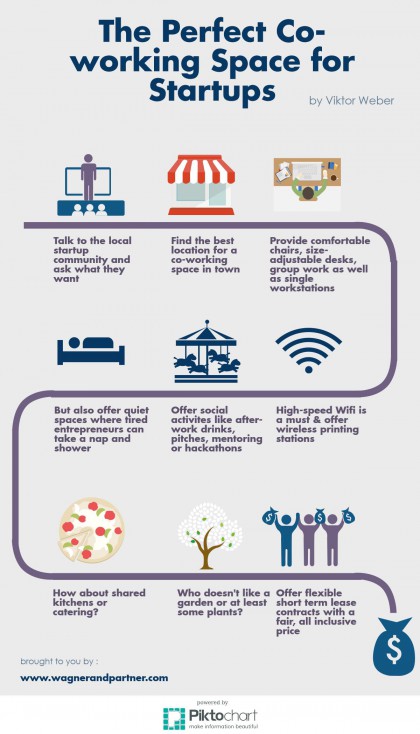Dr. Wagner & Partner took a closer look at the booming co-working movement and asked startup communities around the world what they would love to have in a co-working space. The biggest discussion erupted in the London based startup community, which could be traced back to the high demand for co-working spaces in London. Europe’s financial capital is not only the biggest startup community in Europe but also the most expensive place to set up a new business, let alone renting an own office, which makes co-working very popular among London’s entrepreneurs. These facts, paired with the upcoming lean startup philosophy and bootstrapped business processes, make co-working spaces the only viable option for a startup in need for office space.
The Perfect Co-working Space
It became obvious that a co-working space should offer much more than just a desk, chairs and free internet, because entrepreneurs want not only to pay for a working space but for a striving, like-minded and inspiring community space, which “goes the extra mile” and is not overpriced.
Talking about price, it became clear that most entrepreneurs prefer one fixed price per desk per week or month, instead of flexible tariffs where one has to pay extra for internet, telephone, toilets, kitchens or other amenities. Lease contract flexibility is also very important for every entrepreneur, which is why monthly or even weekly leases would be the best option. The shorter the lease contracts are, the higher the fluctuation might be, which could also harm the community and pose a potential threat to the good atmosphere. This shows, that setting up a co-working space is a long road paved with manifold trade-offs, because entrepreneurs are creative minds who all have their own individual wishes and ideas about an ideal co-working space.

- The Perfect Co-working Space for Startups (Source: Viktor Weber)
The bottom-line and most basic co-working space should thus offer not only high speed internet, flexible lease contracts, desks and comfortable chairs, but also quiet spaces as well as loud co-working areas for social activities. Mentioning this, the social aspect was very prominent during the discussions in the startup communities. Entrepreneurs wish to work with peers that share their interests and help each other out, which can only be achieved in a good co-working atmosphere. Thus, shared kitchens and communal areas for open discussions were wished for as well as hosting of in-house events like investor-meetings, pitch-evenings, after-work-drinks, mentoring talks; all organised by the co-working space operator.
The atmosphere of the co-working space should be warm and friendly, which could be achieved by plenty of daylight, proper artificial lights, plants or a garden. Due to the often long-working hours, the entrepreneurs wished for extra-comfortable chairs, height-adjustable desks, bar tables, a quiet room, where one could take a nap, mini fridges or kitchen facilities, showers, which are cleaned by professional cleaning service. Furthermore, some of the entrepreneurs would want to have a full-catering with breakfast, tea and a late lunch, organised by the co-working space operator.
Some Background Info
Open, inspiring spaces for creative and entrepreneurial people, is the idea behind the relatively new phenomenon of co-working spaces. The first co-working spaces emerged in the late 90s or early 2000ers, but the concept only gained significant momentum after the subprime crisis 2009. In 2010 there were approximately 600 co-working spaces around the globe, today there exist over 3500.
In the early stage, this was a rather US based trend, with co-working spaces being perceived as hip and cool for Silicon Valley’s startups. Now entrepreneurs, digital nomads or even large companies seek the creative atmosphere of a co-working spaces, not only in the US or Europe, but around the world. You can take a look at the evolution of co-working here. The sharp increase of 583%, regarding the number of co-working spaces, is correlated with many factors such as a higher demand for short-term rental flexibility, economic instability, increasing rents in metropolitan areas and the newly emerged startup culture, with startups being the main users of co-working spaces. These shared office-communities offer various amenities with different pricing structures, which makes this newly emerged market still very heterogeneous. Thus it is important from a developer’s or landlord’s point of view to exactly know what aspiring entrepreneurs really want in a co-working space.
End Note
A co-working space is a conceptual tightrope walk, because entrepreneurs wish on the one hand that they can work quietly on their own and on the other hand the want a vibrant community, which offers social activities. The separation by quiet, loud and community space alone, requires a relatively large amount of space, which must be completely furnished. The organisation of relevant social activities like mentoring, pitches, hackathons or conferences requires a certain involvement and knowledge of the co-working space operator with the local startup scene. Due to uprising entrepreneurial community around the globe it can be stated that co-working will not fade away but increase heavily, which offers great business opportunities for the real estate industry or entrepreneurs.

